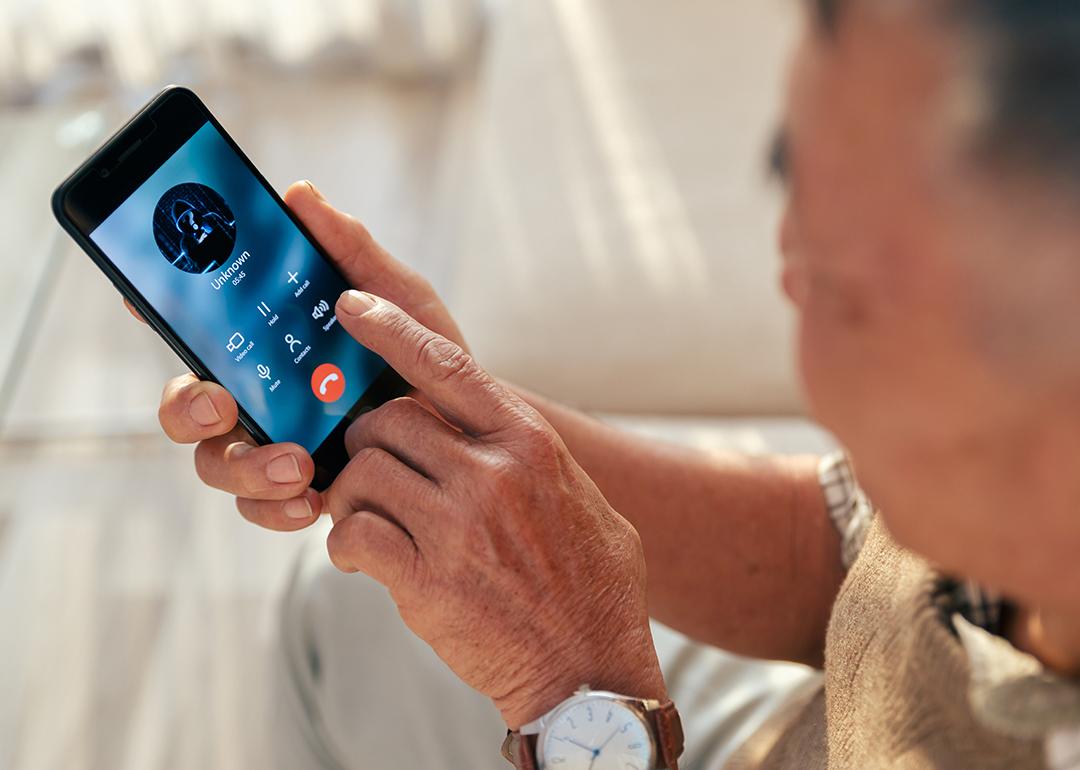
This story was produced by Spokeo and reviewed and distributed by Stacker Media.
10 unscrupulous scams that target senior citizens
However many reasons we have for loving our grandparents, scammers have a whole lot more. That's why fraudsters and hackers are increasingly relentless in targeting a demographic that is often trusting of financial institutions, perhaps too embarrassed to report a loss and at a disadvantage where digital technology is concerned. Seniors offer an easy jackpot for scammers, to the tune of $3 billion in losses annually. They are often homeowners, sitting on top of savings, and in good credit.
Spokeo warns to watch out for these 10 senior citizen scams that target their hard-earned savings.
1. Romance Scams
Flattery has no expiration date, and many a lonely or bereaved senior has found themselves on the receiving end of sudden romantic attention from a curious source. Fraudsters troll social media in search of single seniors and love-bomb them at first with sweet nothings. Soon, however, these give way to something in the form of requests for money, airplane tickets, visas and so on. That's why it's important to set your social media accounts private and do a reverse search of any profile photos or contact details for strangers who do get in touch.
2. Funeral Scams
Fraudsters know that we're at our most vulnerable when we're bereaved. The most cynical will scour death notices in their local press in order to reach out to widowed seniors about an unpaid debt or legacy their spouse left behind. There should be no need for urgency, however. Take their contact details, run a search and expose any scams before they are allowed to progress.
3. Fake Accident — the Original Grandparent Scam
Facebook is the social media platform of choice for seniors, and too many allow themselves to share too much. It's no challenge for a fraudster to scour a senior's profile for family members, then reach out pretending to be a favorite grandchild in an emergency. Usually, the scammer will use a messaging platform to request an emergency transfer to cover hospital treatment, evacuation or some other made-up scenario. Worse still, they often exploit the grandparent's loyalty by swearing them to secrecy. If in doubt, call your grandchild on the number you have stored, or do a reverse check on the number you've been given.
4. Gone Phishing
Seniors did not grow up with email, so some are still unaware that if a message comes into the inbox from the IRS, Social Security Administration, Medicare or the bank, it's probably not authentic. The worst scams contain obvious errors, but the most convincing ones weave a credible tale that may be backed up with threats of prosecution or arrest. Pressed for unpaid taxes or personal information, victims click on the link provided and unwittingly hand control of their banking or personal information to the hacker.
Did you know that you can look up the owner of any email address by performing a reverse email search? You may find the owner's name, address, age, social profiles and much more.
5. Medicare Scam
Fraudsters know that anyone over the age of 65 in the U.S. has Medicare. Since the pandemic, in particular, scammers have exploited panic about vaccines and testing to offer bogus services that require a Medicare ID. As soon as they have what they need, these criminals bill Medicare and pocket the cash, leaving the senior out of pocket and vulnerable.
6. Tech "Support"
The next time Grandma asks for help fixing her laptop, do whatever it takes because scammers are waiting in the wings to swoop in to take advantage. It starts with a call from a seemingly authentic number announcing that a well-known tech service provider has identified a serious problem and needs access to the laptop. With the clock ticking and the threat of a security breach rising, it's easy to comply. By the time a senior realizes that the security breach was self-administered, any funds or savings are usually long gone.
A far more sinister version involves a seemingly concerned call from a bank warning that a savings account has been hacked. The victim is urged to transfer money to a "safe" account temporarily while the bank addresses the problem. The call may even offer a number to call back to verify, which is itself bogus.
7. Robocalls
A similar scam starts with a less dramatic scenario, perhaps, but with no less urgency. The senior receives a call that a familiar service is about to expire and payment is needed. The purpose is either to obtain bank details and passwords or to record a voice sample that can be used to authorize payments on a stolen or cloned credit card.
8. Investment Opportunities
Hackers know that many senior citizens are sitting on a pot of accumulated wealth, and are only too happy to help liberate that cash from its safe storage. The psychological trick these scammers use is to suggest that current savings are likely to be hit by inheritance taxes or might not cover the cost of retirement living. Luckily, they have a "unique and exclusive" investment opportunity that will deliver outstanding dividends. Instead, it's likely to be a pyramid scheme, property scam or sophisticated offshore fraud.
9. Reverse Mortgage
Reverse mortgages, or home-equity conversion mortgages, increased by a staggering 1,300% between 1999 and 2008 (the property crash). They're still a popular target for scammers today. Fraudsters will approach homeowners with an unsolicited offer to either reassess the value of the property or liberate capital. Unfortunately, these reverse-mortgage scams do nothing of the sort; their goal is actually to steal the equity of the property entirely, leaving senior citizens potentially destitute.
10. Fake Websites
The senior section of the spoof website collection includes sites that target the most common pain points for seniors. Top of the list are fake websites for cheap pharmaceuticals, prescription drugs, antiaging products and relief for various ailments. The site may appear to carry all the badges and certificates of the appropriate regulatory agencies, but scammers are counting on the fact that by the time a victim has paid, realized the scam and reported it, the money is out of reach.



